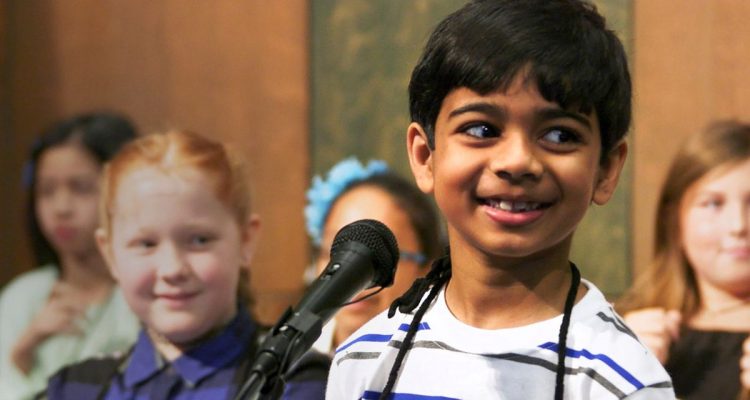Words abound in Sam Rega’s “Spelling the Dream,” which follows the winning streak of Indian-Americans at the National Spelling Bee. The Netflix documentary celebrates a group of young contestants who have dedicated their lives to outsmarting the dictionary, and nearly succeed. When spelling bee organizer Jacques Bailly runs out of words to give his wizkid contestants, he confesses, “We are throwing the dictionary at you and you are winning.” Audiences will also be at a loss for words while watching this inspirational doc.
A big stage with bigger words, the Scripps National Spelling Bee offers a platform for hundreds of kids (under the age of 15) to show off their vocabularies. “To be a winner you probably need to master around 70-100,000 words,” one interviewee says. “They probably also need to learn a couple of different languages.” Just as shocking are the statistics that open the film: Although Indian-Americans make up 1% of the U.S. population, they’ve won the Scripps National Spelling Bee 12 years in a row. How? Skeptics chalk it up to genetics. But Rega wagers that, like anything else, passion, hard work, and role models are key factors.
“Spelling the Dream” serves as a counterpoint to decades of racist assumptions, offering insights and experiences of four contestants, their parents, successful Indian-Americans, and others. It’s also a fun diversion when we need it most. After a couple of interviews with adults, 14-year-old Shourav Dasari, “the Michael Jordan of spelling,” enters the picture, wowing with his scrupulous study methods, including a spreadsheet with the entire dictionary on it. “I got 99 percent of it down,” he brags. Later, Akash Vukoti, an adorably precocious seven-year-old, shows off his approach to studying. “H-U-M-U-H-U-M-U-N-U-K-U-N-U-K-U-A-P-U-A-A,” he spells letter by letter. “Humuhumunukunukuapuaa!”
While we hear from a variety of people, namely Nupur Lala, former spelling bee champ and star of the 2002 doc “Spellbound,” comedian Hari Kondabolu, who compares Scripps to “the Indian-American Superbowl,” and journalist Fareed Zakaria, the film’s strength is in its four contestants. Instead of using cuts or camera angles to provide energy or movement, Rega keeps his camera rolling as these energetic kids hold our attention. They smile and jump and work incredibly hard, showing just how much they care and how little they are influenced by outside components.
What’s missing from the proceedings, however, is any kind of counterbalance. Cheating, squabbling, and South-Asian parental pressures are glazed over. The closest thing to drama, besides the spelling bee itself, is a racist Twitter post: “America needs to step up its game… last three spellers are of Indian decent.” Says the guy who spelled “descent” wrong.
Still, the film’s frustrations melt away in a third act dedicated to the Scripps National Spelling Bee. Broadcast on ESPN, with hundreds of anxious parents in attendance, Rega cranks up the tension with graphics, tracking each speller’s letters on the screen. Only one of these kids will be crowned champion, but everyone leaves a winner, Rega argues. Any Indian-American who made it this far has attained a sliver of the American dream. The color of their skin, the sound of their voice, and the culture they embody may only make up 1% of America’s population. The work they put in to get here, however, spells “universal” and “inspiring.” [B-]
“Spelling the Dream” is available now on Netflix.

